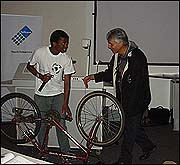This year’s gathering of journalists and media-ICT experts – the 8th annual, held September 16-18, 2004 -- had a bigger-than-ever contingent of delegates from the farther reaches of sub-Saharan Africa – not just from SADC and East Africa, but also from Central and West African nations.
The chatter during the conference tea breaks, lunches and numerous sponsored booze-ups and dinners was just as likely to be in French or Swahili as it was to be in Grahamstown’s ‘mother tongue’ of English – the language of the colonial settlers who made this windy, rainy, sunny (all within the same hour) town their home in the early 19th Century.
Continentalism
Highway Africa’s growing continentalism is the result of an expanding partnership between the project’s South African hosts (Rhodes University and the South African Broadcasting Corporation) and the UN’s Economic Commission for Africa (ECA), based in Addis Ababa.
The ECA’s head of ICT (information and communication technology) programmes, Aida Opoku-Mensah, was on hand for most of the conference, and helped present the ECA’s African Information Society Initiative (AISI) Media Awards on Sept. 16th – in a joint ceremony with the Highway Africa New Media Awards, broadcast live throughout the continent on the SABC Africa TV service.
The 11 different awards, which had attracted more than 250 entries from 30 African countries, recognised innovative use of new technologies and excellence in reporting on ICT issues. The winners included entrants from Senegal, Mali, Togo, Benin, Nigeria, Kenya, Zimbabwe, Botswana, South Africa and Mauritius.
The awards ceremony, featuring local music, gymnastics and excited award-winners, managed to rise above the aesthetic void of the venue -- the 1820 Settler’s Monument, a place seemingly originally planned to house a human-organ-donation library or some such function.
Pedal as you go
 |
| Sivu Mzamo demonstrates his invention |
But the real star of Highway Africa 2004 was not at the awards ceremony. He appeared the next day, in the form of 17-year-old South African Sivu Mzamo, who has developed a bicycle-powered cell-phone charger. As Rhodes Media Studies Head Guy Berger put it, Mzamo’s invention adds a "pedal as you go" dimension to cellular "pay as you go."
Mzamo, who addressed delegates with a charm and maturity well beyond his years and had a bicycle on hand to demonstrate his invention, provided a useful antidote to what is always a liability at such "ICT events" – the droning PowerPoint slides about abstract clichés such as "e-readiness" and "digital inclusion."
Fortunately, Highway Africa 2004 didn’t fall into the "e-cliché" trap too often, and included some strong presentations, including:
- MultiChoice Africa’s presentations on digital and interactive TV
- Alain Modoux’s outline of the media’s place in the World Summit on the Information Society (WSIS) process
- The "Creating Content" presentations by Peter Benjamin (Open Knowledge Network), Shafika Isaacs (SchoolNet Africa) and Heather Ford (Creative Commons)
- Andrew Kanyegirire’s discussion of the place of ICT in the New Partnership for Africa’s Development (NEPAD)
- Gillian Marcelle’s provocative look at the success of cellular phone operator MTN in Nigeria
- Lilian Ndangam’s account of the progress of Senegal’s proposal for a Digital Solidarity Fund (DSF)
One of the more interesting trends discussed was the growing use by TV viewers of cellular SMS messaging to interact with TV programming, with their messages often appearing in the "ticker tape" rolling display at the bottom of the TV screen.
The MultiChoice Africa representative referred to the appeal of this interactivity as "your 168 characters of fame" – an update of the late US pop artist Andy Warhol’s notion of everyone needing "15 minutes of fame." Chris Armstrong is an Associate at the Wits University LINK Centre, Johannesburg.
More information: Highway Africa

